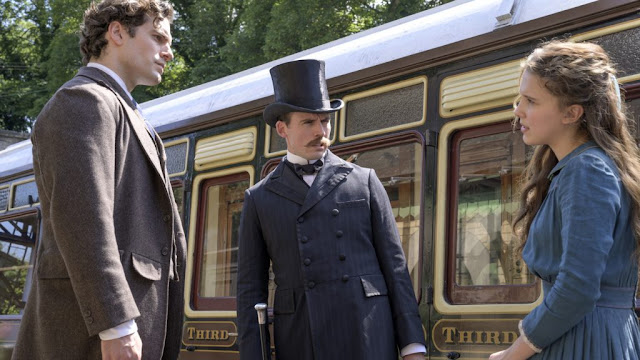Sherlock Holmes is (arguably) the most famous fictional detective in the world; a man of great acumen whose story has spawned various retellings across different forms of media. The latest of which is Netflix's Enola Holmes, concentrating on his sister who inadvertently follows in his detective footsteps.
Now, I will admit I had my apprehensions about watching this film. Aside from the character passing a quick Mary Sue litmus test, the trailer did show bits of ingrained toxic masculinity: femininity is bad, and masculinity is good. No to corsets and yes to martial arts. But here in Conflux, we are not in the habit of judging things at a glance, or else we wouldn't have anything to write about. So I sat down and gave it a watch.
Enola Holmes (played by Millie Bobby Brown) was raised alone by Eudoria Holmes (Helena Bonham-Carter), mother of government official Mycroft Holmes (Sam Claflin), and world-famous detective, Sherlock Holmes (Henry Cavill). Having spent all of her life together with her mother, it comes as a great surprise when Eudoria disappears on Enola's 16th birthday, springing Enola's ingrained detective senses in search of her mother.
To be honest, despite Sherlock Holmes' status and me being a fan of the mystery genre, I have never actually immersed myself in anything derived from Sherlock canon (in recent memory, that is). So I cannot be a judge on whether or not this deserves to be lined up with the other adaptations of Sherlock Holmes.
Although I dismissed Enola as another old Mary Sue, Mille Bobby Brown plays her quite endearingly and I found myself sympathizing with a lost and confused child thrown into the wild ways of the world. I have only ever seen her act as Eleven from Stranger Things, so it was quite refreshing to see her nail a more humorous role, delivered with great comedic timing and vivacious expressions. I cannot judge Henry Cavill if he embodied the character of Sherlock well, although I do think they could have fleshed out his character a bit more. Personally, he did decently; as a bonus, he's quite nice to look at.
Casting-wise, I think everyone did well in their roles, notably Sam Claflin as the foil to his siblings' plans, and I'll even give a nod to the relative newcomer Louis Partridge as the Duke of Tewkesbury (which is honestly one the strangest names I've heard in a while). I will also give props to the casting department, as I observed that quite a number of background characters were people of color.
Another thing that stuck out to me in this movie is the clever and punchy cinematography and usage of animation to tell the story. It aided in the dynamism of the story but did not lose the Victorian English flavor of the film by employing illustrations reminiscent of vintage newspaper editorials. I'm always down to appreciate a good use of animation.
Despite the above, I feel the biggest downfall of the film is what should have been concentrated on the most: the plot. While the pace was adequately engaging and the dialogue clever, it left me wanting for a bit more in the sleuthing side of the story. I'm a big fan of solving puzzles, following clues, deciphering messages, all the fun stuff that you usually see in a mystery film or novel. But I didn't feel like Enola Holmes provided enough of that, concentrating more on the physical fights and dialogues with other characters. When she solved one of the two posited mysteries in the film, it didn't leave me particularly enlightened, and following that, the resolution felt flat and not particularly satisfying.
Also, the film presents two conundrums for Enola to solve; namely, the circumstances of Tewkesbury and the disappearance of Eudoria. While I appreciate a subplot within a plot, I feel like the presentation of both plotlines could have been done in a much smoother manner. Somehow when we were in the middle of the Tewkesbury plot and was reminded of Eudoria, I practically forgot she disappeared. The two plotlines although not completely related could have definitely been weaved together more efficiently. I'm not competent enough to tell you how, but neither was the writer of this film.
Nevertheless, I enjoyed Enola Holmes, only because I was not expecting to come out of a groundbreaking movie. Even though I don't think it's something I'd recommend to another person with enthusiasm, I always appreciate a plucky heroine, and perhaps I would have enjoyed this immensely as a preteen. I am glad, however, that preteen girls of this generation have someone like Enola Holmes to admire, and hopefully, this opens up more opportunities for young heroines in films.



